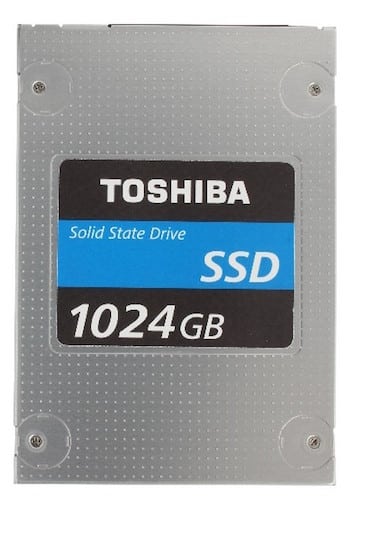Toshiba has announced three distinct families of PCIe SSDs products, the BG1, XG3, and PX04P series of SSDs, all of which leverage the NVMe protocol. The new lines are targeted towards a variety of use cases and applications and are built to be optimized for high-performance and low latency all the while utilizing the PCIe interface. As a result, this creates point-to-point links with the processor to lessen system bottlenecks.
Toshiba has announced three distinct families of PCIe SSDs products, the BG1, XG3, and PX04P series of SSDs, all of which leverage the NVMe protocol. The new lines are targeted towards a variety of use cases and applications and are built to be optimized for high-performance and low latency all the while utilizing the PCIe interface. As a result, this creates point-to-point links with the processor to lessen system bottlenecks.
Designed for high performance notebooks, 2-in-1 PCs and all-in-one PCs, the XG3 family of SSDs is the industry’s highest capacity (1024GB) client NVMe SSD in the M.2 Type 2280 form factor. The new line supports up to four lanes of PCIe 3.1, which has a maximum interface bandwidth upwards of six times the speed of SATA 6Gbits/s. In addition, Toshiba indicates that their XG3 line is the industry’s first NVMe SSD available in 2.5-inch SATA express form factor. The XG3 SSDs are equipped with the company’s proprietary Quadruple Swing-By Code error-correction technology, which is a highly efficient error correction code that helps to protect customer data from corruption all the while improving reliability, the life of Toshiba SSDs. The XG3 series also features lower power-state modes and is the first Toshiba product, in addition to the BG1 SSD family, to support the Trusted Computing Group specification, Pyrite (TCG Pyrite).
Designed for thin notebooks, 2-in-1/convertible notebooks and tablets, Toshiba’s BG1 line of SSDs is another world’s first, as it is the industry’s smallest NVMe SSD. The new line is available in a single 16mm x 20mm package (M.2 Type 1620) or a removable M.2 Type 2230 module with up to 256GB in capacity. In addition, the BG1 family gives PC OEMs the ability to produce thin mobile PCs and tablets, which allows them boast improved performance over SATA SSDs for mobile PCs.
The new PX04P enterprise SSDs are specifically designed for servers and storage appliances that require scalable power and performance settings. The PX04P series use the 2.5-inch NVMe form factor and claims to have the industry’s lowest power consumption. Toshiba indicates that it uses only 18 watts in active power to push for maximum performance and combines power plus performance to bring low TCO. In addition, the new The PX04P series is compatible with up to four lanes of PCIe 3.0 and is available in either a HHHL add-in card or a 2.5-inch form factor with SFF-8639 connector. The PX04P series also use the company’s QSBC error-correction technology.
Availability
Toshiba’s plans to sample their newest NVMe PCIe SSDs sometime in Q4 2015 and will be on display this week at the Flash Memory Summit in San Jose.
Sign up for the StorageReview newsletter

